
A close reading of Martin Luther King, Jr.'s "Letter from a Birmingham Jail."
- Subject:
- Political Science
- Social Science
- Material Type:
- Lesson
- Provider:
- Khan Academy
- Provider Set:
- Khan Academy
- Author:
- Sal Khan
- Date Added:
- 07/16/2021

A close reading of Martin Luther King, Jr.'s "Letter from a Birmingham Jail."
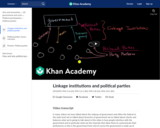
Linkage institutions: elections, media, interest groups and political parties.

Magna Carta (Latin for Great Charter) is an Angevin charter originally issued in Latin in June 1215. The
Magna Carta was the first document forced onto a King of England by a group of his subjects in an attempt to limit his powers by law and protect their rights.
The charter is widely known throughout the English speaking world as an important part of the protracted historical process that led to the rule of constitutional law in England and beyond. Read a translation into English here.
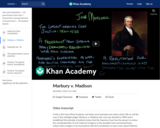
A deep dive into Marbury v. Madison, a Supreme Court case decided in 1803 that established the principle of judicial review. In this video, Kim discusses the case with scholars Michael Klarman and Kevin Walsh.
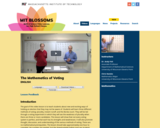
The goal of this video lesson is to teach students about new and exciting ways of holding an election that they may not be aware of. Students will learn three different methods of voting: plurality, instant runoff, and the Borda count. They will be led through a voting experiment in which they will see the weakness of plurality when there are three or more candidates. This lesson will show that not every voting system is perfect, and that each has its strengths and weaknesses. It will also promote thought, discussion, and understanding of the various methods of voting.
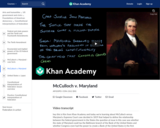
A deep dive into McCulloch v. Maryland, a Supreme Court case decided in 1819. It established the supremacy of federal law over state law. In this video, Kim discusses the case with scholars Randy Barnett and Neil Siegel.
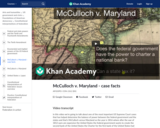
The landmark Supreme Court case that established strong implied powers for the federal government.
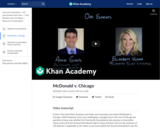
A deep dive into McDonald v. Chicago, a 2010 Supreme Court case that ruled that the Second Amendment's right to keep and bear arms for self-defense in one's home is applicable to the states through the Fourteenth Amendment. In this video, Kim discusses the case with litigator Alan Gura and Elizabeth Wydra, President of the Constitutional Accountability Center.
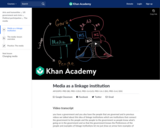
Media as a linkage institution. Incentives for media to cater to ideologies of target audience.
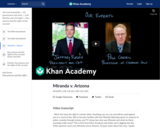
A deep dive into Miranda v. Arizona, a Supreme Court case decided in 1966. This case established the "Miranda rule," which requires police to inform suspects in police custody of their rights. In this video, Kim discusses the case with scholars Paul Cassell and Jeffrey Rosen.
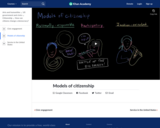
Comparing different models of what it means to be a good citizen. Created by Kimberly Kutz.
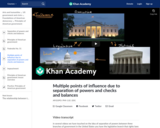
Multiple points of influence due to separation of powers and checks and balances.
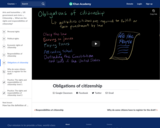
An overview of Obligations of citizenship. Created by Kimberly Kutz.
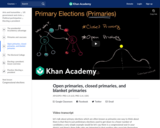
An overview of open primaries, closed primaries and blanket primaries.
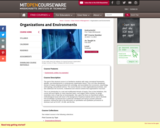
Examines theory and research on the relationship of organizations to each other and to their economic, political, and social environments. Classic and contemporary approaches to complex social systems, the dynamics of inertia and change, the role of legitimacy, and the production of change as an intended or unintended consequence. Considers the relative roles of voluntarism and determinism in the pursuit of organizational agendas and in the shaping of organizational environments, for example, with respect to changing employment relationships and environmentalism. Primarily for doctoral students. The goal of this doctoral course is to familiarize students with major conceptual frameworks, debates, and developments in contemporary organization theory. This is an inter-disciplinary domain of inquiry drawing primarily from sociology, and secondarily from economics, psychology, anthropology, and political science. The course focuses on inter-organizational processes, and also addresses the economic, institutional and cultural contexts that organizations must face. This is an introduction to a vast and multifaceted domain of inquiry. Due to time limitations, this course will touch lightly on many important topics, and neglect others entirely; its design resembles more a map than an encyclopedia. Also, given the focus on theoretical matters, methodological issues will move to the background. Empirical material will be used to illustrate how knowledge is produced from a particular standpoint and trying to answer particular questions, leaving the bulk of the discussion on quantitative and qualitative procedures to seminars such as 15.347, 15.348, and the like.
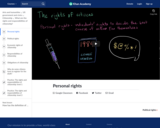
An overview of Personal rights. Created by Kimberly Kutz.
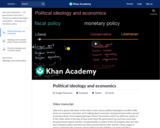
How liberals, conservatives, and libertarians think about fiscal and monetary policy. Discussion of Keynesian and supply-side economics.
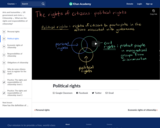
An overview of Political rights. Created by Kimberly Kutz.
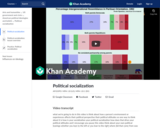
Factors that influence an individual's political attitudes and values.
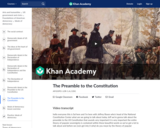
The Preamble is the introduction to the US Constitution, but it's so much more than that. In this video, Sal discusses the Preamble with Jeffrey Rosen, President and CEO of the National Constitution Center.